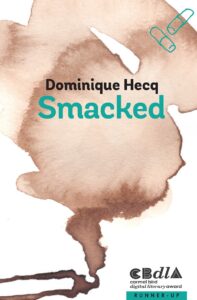We are delighted to repost, with permission, this fascinating review by Julia Prendergast of Dominique Hecq’s collection, Smacked and other stories of addiction. Review: The title of this review is taken from the superbly restrained love story ‘Beyond the Doubting of Shadows’, from Dominique Hecq’s most recent short story collection, Smacked and other stories of addiction (2021, pp. 87–92). Do shadows speak? This question ghosts each of the stories and the umbra that binds them. Hecq is in conversation with the complexity of the question through the depiction of various forms of addiction, habit, and substance abuse – casting shadows, blocking the light that eclipses sources of illumination – ‘Addiction comes in rainbow, unrainbow’ (p. 20). Hecq speaks in tongues of refraction, from a number of fictional vantage points.
Review: The title of this review is taken from the superbly restrained love story ‘Beyond the Doubting of Shadows’, from Dominique Hecq’s most recent short story collection, Smacked and other stories of addiction (2021, pp. 87–92). Do shadows speak? This question ghosts each of the stories and the umbra that binds them. Hecq is in conversation with the complexity of the question through the depiction of various forms of addiction, habit, and substance abuse – casting shadows, blocking the light that eclipses sources of illumination – ‘Addiction comes in rainbow, unrainbow’ (p. 20). Hecq speaks in tongues of refraction, from a number of fictional vantage points.
As a composite picture, the stories attend reverently to the text’s opening epigraphs: What is addiction really? It is a language that tells us about a plight that must be understood; Style is a function of theme (Alice Miller; Julian Barnes, emphases in original). How does Hecq do this? Through concrete and specific detail as crescent moon – penumbra – addiction, habit, and substance abuse, always about something else – regret, grief, trauma, loss, desire – lurking, shadow-speaking, in alterity.
In The Art of Time in Fiction, Joan Sibler (2009, p. 5) suggests that ‘All fiction has to contend with the experience of time passing’. The stories in Smacked focus time as a kind of conflict of subjectivity – a deep longing for connectivity undergirded by a compulsion or resignation toward aloneness. An overarching shadow, sparklit, speaks to matters of love and fraught intimacy – a concern that we may, ever, have only our embodied relationship to moments in time – speak, shadows, speak – ‘High up the crack in the rock is a threesome of bats hanging and silent’ (Hecq, 2021, p. 121).
If you break between ‘sittings’ – or walk/reading as the case may be – who can sit still when reading Smacked? – you are likely to dream in the way shadow-speak wires us to dream – circling stories that refuse to standalone in the mind’s eye: ‘A half-cut moon against the crescent sky’ (Hecq, 2021, p. 110). Books that do not end, will never end, leave us with questions. At the heart of this book is a fixation upon moments-in-time – time past and absent-present – embodied moments, past and passing.
Smacked puts me in mind of Veronica O’Keane’s A Sense of Self: Memory, the Brain, and Who We Are. O’Keane investigates how we make memories and how memory makes us. In the foreword to the text, O’Keane (2021, p. vii, emphasis in original) addresses a discrepancy in the translation of Proust’s A la Recherche du Temps Perdu, ‘initially translated in 1954 as Remembrance of Things Past’ and later, in 1992 ‘to the more accurate In Search of Lost Time’, suggesting that:
The original translation’s ‘rememberance of’ suggests a passive recall of memories from a hidden and fixed repository, while the later translation’s ‘in search of’ suggests an active pursuit of a past that is not lost. Neuroscience [O’Keane suggests] has almost caught up with Proust in the interval between the translations.
Hecq’s obsessive return to the riddle of past and passing moments, and their impact upon us, is consistent with O’Keane’s analysis of memory – to moments in time that are rendered timeless and hold us in that ever-shifting (skin-thinking) shadowland.
The brevity of short-form writing makes it an apt vessel for capturing the haunting incompleteness of human experience. Hecq’s stories are next level – they are the remarkably restrained achievements of a storyteller-poet who knows constraint, who understands precisely when to opt in (or more pertinently out) of the light. Individually and collectively, the stories are taut, tensile, restrained, and deeply associative – shadowy word-webs, focalised through highly idiosyncratic ‘register[s] of intelligence’ (Wharton, 1997, p. 63). Edith Wharton provides the most apt description I have encountered, about the capacity of literary fiction to convey feeling. Wharton says:
The impression produced by a landscape, a street or a house should always, to the novelist, be an event in the history of a soul, and the use of the ‘descriptive passage,’ and its style, should be determined by the fact that it must depict only what the intelligence concerned would have noticed, and always in terms within the register of an intelligence. (Wharton, 1997, p. 63, my emphasis)
Hecq examines the conundrum and contradiction of human experience through carefully crafted detail, meshed sensory detail – emotionally smacking – and always an event in the history of a soul.
How is this act of conveyance possible? I sidestep to a question from Gordon Weaver who asks: ‘in how small a space can [we] create the felt presences that animate successful stories’ (in Shapard & Thomas 1983, p. 228). Hecq captures felt presences as a collection of fractured subjectivities – ‘the moon and its many faces’ (Hecq, 2021, p. 20). The range in Smacked – the vastness of the registers – the way we are called to read them individually and will never adequately separate them – this leaves me reeling. Hecq probes us to consider our fractured subjectivity within the context of the lives we live, have lived, the dreams we dream, will dream, our irreconcilable extremes – ‘part of the glowing mellow darkness but sure and solid as amber’ (p. 79). In reading Smacked, we are called to question the impact of moments-in-time on our subjectivity – interrogatively.
This process of interrogation prompts me to ask myself – again and endlessly – how it is possible that story-work can enter our affect cycle as if it were lived experience. Through shadow speak – ‘as if [we have] memories of having memories’ (Hecq, 2021, p. 21) At every turn, we are pushed to look beyond addiction (in all its guises), substance abuse (and all its carnage), habit (as lure and shackle). Hecq achieves this by writing in deep homage to the crucial relationship between idiosyncratic voice and sharply rendered detail. As if she were writing in response to Hecq’s Smacked, Lydia Davis asks (1983, p. 230):
What is certain, in any case, is that we are more aware of the great precariousness and the possible brevity of our lives than we were in the past, our lives being actually more precarious than they used to be, and for this reason, perhaps, we express not only more despair but also more urgency in some of our literature now, this urgency also being expressed as brevity itself.
Urgency is apt. I read the collection twice, in shadowy succession – ‘It’s been a long time since [I’ve] been able to think’ (Hecq, 2021, p. 71). I read in deep reverence for the restraint of the authorial register, ghosting the fictional registers – the deft hand behind the word-work. This book begs returning to, even as it will ‘destroy all that seemed evident and make solitude exhilarating, complete, irrelevant’ (p. 89).
In a multi-cast shadow, the voices in Smacked become inextricably woven together in the reader’s mind – a cacophony of shadow-speak – not because they are indistinguishable but because they are acutely realised, held at intimate arm’s length by a storyteller-poet who orbits the theme of moments-in-time as felt presences from diverse vantage points – wondering, uselessly, if ‘we can perhaps at least hear ourselves unfeel’ (Hecq, 2021, p. 69).
Unsurprisingly, Smacked was awarded runner up in the Carmel Bird Digital Literary Award. A tribute to the way Hecq wrestles with the riddle of experience, the shadowy distance between the remember and the remembered event, the sly cunning of memory – our entrapment in revisiting the im/perfect shadow and the light – umbra-penumbra-antumbra – distinct components of a shadow, created by a light source that touches an opaque object. Hecq addresses not only the question of whether shadows speak, which is a given in this collection, but the question of umbra-penumbra-antumbra – ‘where do those shadows come from?’ (p. 91).
Reference List
Davis, L. (1983), ‘Lydia Davis’ in R. Shapard and J. Thomas (Eds.), Sudden Fiction: American Short-Short Stories. Gibbs Smith.
Sibler, J. (2009). The art of time in fiction. Graywolf Press.
O’Keane, V. (2021). A sense of self: Memory, the brain and who we are. W. W. Norton & Co. Ltd.
Shapard. R., & Thomas, J. (Eds.). (2013). Sudden fiction: American short-short stories. Gibbs Smith.
Wharton, E. (1997). The Writing of Fiction. Touchstone: Simon & Schuster.
Credits
Review reproduced with permission from Text.
Photo credit: jongsun-lee-unsplash
Smacked and other stories of addiction is available as print | ebook | audiobook. Click for more info, here.
About the reviewer
JULIA PRENDERGAST’S collection, Bloodrust and other stories is available here. Her novel, The Earth Does Not Get Fat, was published in 2018 and longlisted for the Indie Book Awards for debut fiction. Her short stories have been recognised and published: Lightship Anthology International Short Story Competition (UK), Ink Tears International Short Story Competition, Glimmer Train International Short Story Competition (US), Séan Ó Faoláin International Short Story Competition, TEXT, Elizabeth Jolley Prize, Josephine Ulrick Prize.

